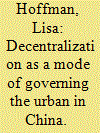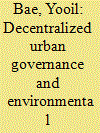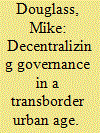|
|
|
Sort Order |
|
|
|
Items / Page
|
|
|
|
|
|
|
| Srl | Item |
| 1 |
ID:
128527


|
|
|
|
|
| Publication |
2013.
|
| Summary/Abstract |
This paper considers what a Foucauldian-informed analysis of decentralization and urban transformation offers to current debates. It analyzes decentralization as a new regime of governing, in contrast to many studies that treat it as a policy process, objective or outcome aimed at alleviating some problem of centralized authority. Rather than understanding decentralization as less state governance, this paper asks how practices such as local autonomy are in fact technologies of governing the urban. Decentralization is analyzed then not simply as an absence of some central state power, either in the political or fiscal realm, but rather, as new mechanisms of governing the urban, which are linked with the regulation and constitution of subjects. The paper focuses on an aspect of decentralization that typically is under-examined: the decentralization of welfare provisioning in urban China. Under high socialism of the Maoist era, social services for urban residents were distributed by the state, through the work unit (danwei) as part of the planned economy. In recent years, however, major reforms have been put into place to diversify the ways in which social services are delivered, under a general rubric of decentralizing the distribution away from the state. Based on anthropological research in Dalian, a major port city in northeast China, this paper examines a new social practice and subject form that has emerged with new ways of caring for those in need in the city: volunteerism. By focusing on this resulting social form, the paper argues that we may better understand how decentralization is not a singular process with multiple outcomes, but rather, a complex assemblage of elements that includes technical questions about how to govern as well as normative practices of subject formation. An analytical disaggregation of these elements also allows us to avoid the assumption that decentralization necessarily contains certain characteristics, or that it will lead to particular kinds of political and social forms.
|
|
|
|
|
|
|
|
|
|
|
|
|
|
|
|
| 2 |
ID:
128524


|
|
|
|
|
| Publication |
2013.
|
| Summary/Abstract |
This paper explores how decentralization has created a "local political arena" and has been transforming governance in the environmental management sector in South Korea. Korea has been known as a developmental state where the strong central government and businesses have conspicuously dominated during most of its industrialization period. Yet, the deepened democracy, global competitiveness and fiscal austerity have pressured central political stakeholders to devolve highly centralized functions and authority to local bodies since the mid-1990s. The building of democratic institutions at the local level, including directly elected mayors and city councils, has created room for local politics and diminished central political leverage over local affairs. The national economic crisis has highlighted the inefficiency of the centralized system and encouraged further administrative and fiscal decentralization under the democratic governments. In this issue image_86_4_Baecontext, while the central government and big businesses continue to have a significant say in policy making, local executives, with their expanded decisional authority and resources, are trying to improve the images of their cities and to take responsibility for promoting urban economies and improving quality of life in the age of trans-border links and competition. This paper analyzes the case of Ulsan, where Hyundai and several other conglomerates are located and which has been a symbol of state-led industrialization during most of the development period. Despite the large role played by the centre in the development of Ulsan, the empowered mayor of the city has successfully turned citizens' attention to post-industrial aspects of governance for ensuring the future competitiveness of the city in global markets by orchestrating collaborative implementation of environmental policies. The paper explores how this governance shift in Ulsan has led successful collaborative environmental change by mobilizing local businesses, civic organizations and general citizens who might not have been interested in the making of an "environment-friendly city
|
|
|
|
|
|
|
|
|
|
|
|
|
|
|
|
| 3 |
ID:
128523


|
|
|
|
|
| Publication |
2013.
|
| Summary/Abstract |
The devolution of political power to local governments is taking new directions as cities begin to look beyond national borders to create economic synergies with city regions in other countries rather than continuing to look to linkages with their capital cities for economic benefits. In East Asia the search for transborder urban linkages comes at a time when secondary cities in higher income countries are confronting major social and economic transformations. These new trends include: the rise of China in the global economy, the turn toward neoliberal downsizing of government, demographic transitions toward declining, rapidly aging populations with a diminishing labour force compensated partly by the large-scale recruitment of foreign workers and foreign spouses. The combined result of the new dynamics is that just when political power is being devolved to the urban scale, the global trend of "shrinking cities" has reached them. The discussion focuses on recent initiatives of the local governments of Busan,OLYMPUS DIGITAL CAMERA South Korea, and Fukuoka, Japan, to build a "common living sphere" through transborder linkages to provide a culturally rich, people-centered alternative that contrasts with the high-technology industrial clusters being planned for them from their corporatized capital cities. In addition to economic issues, cities engaged in such transborder initiatives challenge the meaning of national borders and citizenship while also confronting new issues in accommodating the appearance of multicultural societies, which have all remained outside of mainstream discussions on decentralization.
|
|
|
|
|
|
|
|
|
|
|
|
|
|
|
|
| 4 |
ID:
128525


|
|
|
|
|
| Publication |
2013.
|
| Summary/Abstract |
Much of the urban growth in developing countries is taking place along infrastructure corridors that connect cities. The villages along these corridors are frenzied and contested sites for the consolidation and conversion of agricultural lands for urban uses. The scale of changes along these corridors is larger than the political jurisdiction of local governments, and new regional institutions are emerging to manage land consolidations at this corridor scale. This article compares two inter-urban highways in India and the issue image_86_4_Hwy Urbanization - Balakrishnanhybrid regional institutions that manage them: the Bangalore- Mysore corridor, regulated by parastatals, and the Pune-Nashik corridor, by cooperatives. It traces the emergence of parastatals and cooperatives to the turn of the twentieth century, the ways in which these old institutions are being reworked to respond to the contemporary challenges of highway urbanization, and the winners and losers under these new institutional arrangements. I use the term "negotiated decentralization" to more accurately capture the back-and-forth negotiations between local, regional and state-level actors that leads to context-specific regional institutions like the parastatals and cooperatives
|
|
|
|
|
|
|
|
|
|
|
|
|
|
|
|
| 5 |
ID:
128521


|
|
|
|
|
| Publication |
2013.
|
| Summary/Abstract |
Asia is the most populous and rapidly urbanizing region in the world today and features 23 of the world's 40 biggest metropolitan areas. In many Asian countries, accelerated economic development, industrialization and urbanization have been accompanied by a growing acceptance that decentralization (the devolution of central state powers, responsibilities and resources to the sub-national scale)4 can lead to more effective and responsive governance in state, provincial, city and regency jurisdictions. This trend toward decentralized governance in Asia has often, but not always, been precipitated by a transition away from authoritarian regimes to more democratic forms of governance. Discourses about the desirability of democratic decentralization have typically emphasized the devolution of central state authority as the preferred means by which to empower communities and to increase the voice and participation of ordinary citizens in governmental decision-making processes that affect their lives and livelihoods. Thus, decentralization policies in urbanizing Asia have aimed to encourage the active involvement of urban residents in addressing shared dilemmas concerning issues such as environmental sustainability, public service delivery, community building and socio-political stability in often densely concentrated and ethnically diverse populations. At the same time, however, decentralization within the contexts of globalization and privatization may circumvent critical aspects of democratic procedure if sub-national government officials use their increased access to state power and resources to nurture clientelistic networks of patronage and/or to tap into wider circles of regional or global economic activity at the expense of local urban development.
|
|
|
|
|
|
|
|
|
|
|
|
|
|
|
|
| 6 |
ID:
128528


|
|
|
|
|
| Publication |
2013.
|
| Summary/Abstract |
The year 2011 marked the tenth anniversary of the implementation of Indonesia's regional autonomy laws. This paper considers implications of more than a decade of decentralized governance for urban development in Indonesia. After a brief historical overview and consideration of the rationale for political and administrative decentralization issue image_86_4_Bunnellin that national context, we examine a range of critical perspectives on policy outcomes. Both media coverage and academic analyses have overwhelmingly cast decentralized governance as it has been implemented in Indonesia in a negative light. As a corrective to this, we have sought to identify positive outcomes and possibilities associated with Indonesia's large-scale decentralization project. In particular, we detail the cases of two cities which have been cast in a variety of rankings and media representations as success stories of urban development through decentralized governance: Solo (or Surakarta as the city is also formally named) and Surabaya. In the final section of the paper, we critically evaluate these two cases and discuss their wider implications.
|
|
|
|
|
|
|
|
|
|
|
|
|
|
|
|
| 7 |
ID:
128526


|
|
|
|
|
| Publication |
2013.
|
| Summary/Abstract |
Since 2000 in New Delhi, urban decentralization has mainly come in the form of the highly visible Bhagidari or partnership scheme, inviting city residents to participate in a "process of dialogue and the discovery of joint-solutions." This paper critically examines this program between 2000 and 2012, through the experiences of primarily middle-class neighbourhood organizations (called Resident Welfare Associations, or RWAs) that were included in the scheme. The paper argues that rather than constitutional decentralization, Bhagidari as an initiative must be read in terms of a larger shift to entrepreneurial governance. Bhagidari's success has been in delegating management to voluntary middle-class neighbourhood associations called RWAs, at little cost to city government, while seemingly opening up a "participatory" space for middle-class urban issue image_86_4_Decentralized Delhi_Mehraresidents in civic affairs. However, the article argues that Bhagidari's impact has come to represent an attempt at harnessing and managing the new middle-class aspiration to engage with urban government for administrative and political ends. In this context, Bhagidari has also been seen as an important means of cultivating middle-class consent and a constituency through courting RWAs for an ambitious chief executive. Over time, this has become a common strategy for building political and civic visibility for a range of actors, and thus the number of RWAs has proliferated
|
|
|
|
|
|
|
|
|
|
|
|
|
|
|
|
|
|
|
|
|